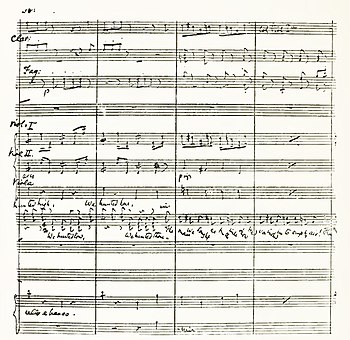Theatre music

Theatre music refers to a wide range of music composed or adapted for performance in theatres. Genres of theatre music include opera, ballet and several forms of musical theatre, from pantomime to operetta and modern stage musicals and revues. Another form of theatre music is incidental music, which, as in radio, film and television, is used to accompany the action or to separate the scenes of a play. The physical embodiment of the music is called a score, which includes the music and, if there are lyrics, it also shows the lyrics.
History
Since the earliest days of the theatre, music has played an important part in stage drama. In
In the 16th and 17th centuries, theatre music was performed during the action of plays and as afterpieces. Christopher R. Wilson, discussing Shakespeare's use of music, lists "stage music" (fanfares to introduce important characters or accompany battle scenes), "magic music" (as in the lullaby in A Midsummer Night's Dream), "character music" (as in Twelfth Night, illustrating the high, low, sad or merry natures of the characters) and "atmospheric music" (such as Ariel's "Where the bee sucks", in The Tempest).[3] By the early 18th century, music was firmly established as part of practically all theatrical performances in Europe, whether of opera, dance, or spoken drama. Theatres were built with orchestra pits, and music was either specially composed for the production or appropriated and arranged from existing material.[1]
The writer Roger Savage notes in
See also
Bibliography
- Green, Stanley. Encyclopedia of the Musical Theatre. New York: Dodd, Mead, 1976
References
- ^ a b c d e f Savage, Roger. "Incidental music", Grove Music Online. Oxford Music Online, accessed 13 August 2012 (subscription required)
- ^ Arnold, Denis, et al. "Opera", The Oxford Companion to Music, ed. Alison Latham, Oxford Music Online, accessed 13 August 2012
- ^ Wilson, Christopher R. "Shakespeare, William", Grove Music Online, Oxford Music Online, accessed 13 August 2012 (subscription required)
- ^ Kennedy, Michael, ed. "Incidental Music", The Oxford Dictionary of Music, 2nd ed. rev., Oxford Music Online, accessed 13 August 2012 (subscription required)
External links
- PDF.
- The European Library — digital images of the most important pieces of music published in Europe, free access.
- Project Gutenberg
